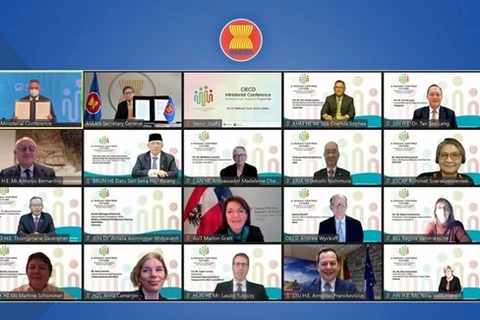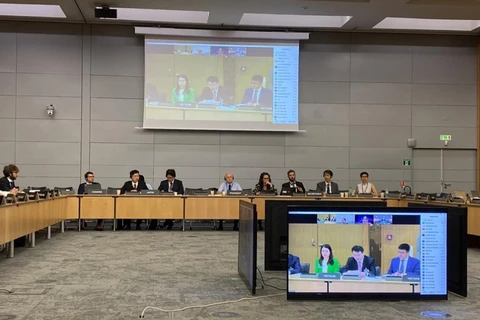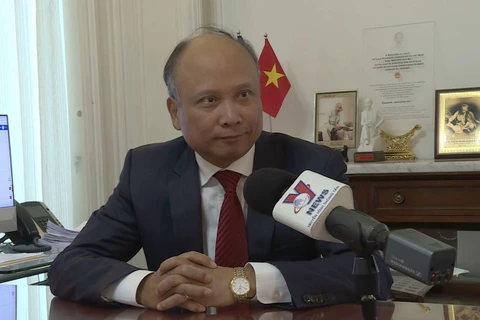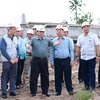Hanoi (VNA) – The Organisation for Economic Cooperation and Development (OECD) Southeast Asia Ministerial Forum 2022 opened in Hanoi on October 17.
Themed “Connecting Regions: Partnership for Resilient and Sustainable Supply Chains,” the event was co-organised by the OECD, the Vietnamese Ministry of Foreign Affairs and the Australian Embassy in Vietnam.
It was the initiative of Vietnam and Australia as the co-chairs of the OECD-run Southeast Asia Regional Programme (SEARP), and the first important event of the programme in the 2022-2025 period.
In his remarks, Vietnamese Minister of Foreign Affairs Bui Thanh Son expressed his hope that participants will look into causes behind disruption in supply chains and their impacts on the global economy, as well as the recovery and shift of the supply chains in the time ahead.
He suggested them propose policies and measures to enhance resilience and self-reliance of economies, and identify cooperation orientations between the OECD and Southeast Asian nations.
OECD Secretary-General Mathias Cormann commended Vietnam’s co-chairmanship of the SEARP for the first time, saying it reflects the confidence of OECD member countries and other nations in the region in Vietnam’s capacity in linking the OECD with the region.
Lauding Vietnam’s active contributions to the SEARP in its capacity as the co-chair, Cormann pledged to continue coordinating with Vietnam in promoting cooperation between the OECD and Southeast Asian nations and realising the OECD-ASEAN action plan.
He asked the participants to discuss potential of regional economies and support of OECD countries to the Southeast Asian region.
Addressing the forum, Vietnamese Deputy Prime Minister Pham Binh Minh stressed the significance of Southeast Asia to the global economy, saying that with a population of 660 million, the region is expected to become the world's fourth largest economy by 2030.
As the co-chair of the SEARP for 2022-2025, Vietnam stands ready to contribute to forging cooperation between the OECD and Southeast Asia in a more comprehensive, effective, practical and sustainable manner, he affirmed.
Minh suggested intensifying supply chain cooperation between the two sides in a stable, sustainable and fair way, and utilising the existing economic networks, especially the Regional Comprehensive Economic Partnership (RCEP), the Comprehensive and Progressive Agreement for Trans-Pacific Partnership (CPTPP) and free trade agreements between Southeast Asia and the OECD.
The Deputy PM called on the OECD countries to help Southeast Asia bring into full play its potential in digital economy, high-tech agriculture and innovation, and consider coordination in developing digital and farm produce supply chains.
The Vietnamese Government will continue to facilitate investment in such priority areas as high-tech, IT, supporting industries, smart agriculture, environmental protection, renewable energy and infrastructure in service of social welfare, he emphasised.
Minh said he hoped that FDI firms from the OECD countries and other Southeast Asian nations will help Vietnam accelerate its industrialisation and modernisation process, especially in personnel training, research-development, innovation and technology transfer, thus turning Vietnam into a centre in regional and global value chains.
He also called on the OECD to assist Southeast Asia in upgrading infrastructure and building ASEAN into a logistics centre, including the logistics complex in Vietnam’s northern province of Vinh Phuc.
“We hope that the OECD will help Vietnamese small-and medium-sized enterprises in accessing international capital markets, transferring technologies, improving administration capacity and competitiveness, developing key products and building strong brands,” he continued.
The Deputy PM suggested the two sides effectively implement the OECD-ASEAN memorandum of understanding, particularly in priority areas like tax, trade facilitation, investment, digital transformation and personnel training.
He stressed that maintaining a stable environment and ensuring the circulation of goods through international waters, including the East Sea, is both right and task of all countries.
Minh expressed his hope that comprehensive, feasible solutions will be raised at the forum to advance and deepen the relations between the OECD and Southeast Asia for peace, stability, cooperation and development in the region and the world at large./.
Themed “Connecting Regions: Partnership for Resilient and Sustainable Supply Chains,” the event was co-organised by the OECD, the Vietnamese Ministry of Foreign Affairs and the Australian Embassy in Vietnam.
It was the initiative of Vietnam and Australia as the co-chairs of the OECD-run Southeast Asia Regional Programme (SEARP), and the first important event of the programme in the 2022-2025 period.
In his remarks, Vietnamese Minister of Foreign Affairs Bui Thanh Son expressed his hope that participants will look into causes behind disruption in supply chains and their impacts on the global economy, as well as the recovery and shift of the supply chains in the time ahead.
He suggested them propose policies and measures to enhance resilience and self-reliance of economies, and identify cooperation orientations between the OECD and Southeast Asian nations.
OECD Secretary-General Mathias Cormann commended Vietnam’s co-chairmanship of the SEARP for the first time, saying it reflects the confidence of OECD member countries and other nations in the region in Vietnam’s capacity in linking the OECD with the region.
Lauding Vietnam’s active contributions to the SEARP in its capacity as the co-chair, Cormann pledged to continue coordinating with Vietnam in promoting cooperation between the OECD and Southeast Asian nations and realising the OECD-ASEAN action plan.
He asked the participants to discuss potential of regional economies and support of OECD countries to the Southeast Asian region.
Addressing the forum, Vietnamese Deputy Prime Minister Pham Binh Minh stressed the significance of Southeast Asia to the global economy, saying that with a population of 660 million, the region is expected to become the world's fourth largest economy by 2030.
As the co-chair of the SEARP for 2022-2025, Vietnam stands ready to contribute to forging cooperation between the OECD and Southeast Asia in a more comprehensive, effective, practical and sustainable manner, he affirmed.
Minh suggested intensifying supply chain cooperation between the two sides in a stable, sustainable and fair way, and utilising the existing economic networks, especially the Regional Comprehensive Economic Partnership (RCEP), the Comprehensive and Progressive Agreement for Trans-Pacific Partnership (CPTPP) and free trade agreements between Southeast Asia and the OECD.
The Deputy PM called on the OECD countries to help Southeast Asia bring into full play its potential in digital economy, high-tech agriculture and innovation, and consider coordination in developing digital and farm produce supply chains.
The Vietnamese Government will continue to facilitate investment in such priority areas as high-tech, IT, supporting industries, smart agriculture, environmental protection, renewable energy and infrastructure in service of social welfare, he emphasised.
Minh said he hoped that FDI firms from the OECD countries and other Southeast Asian nations will help Vietnam accelerate its industrialisation and modernisation process, especially in personnel training, research-development, innovation and technology transfer, thus turning Vietnam into a centre in regional and global value chains.
He also called on the OECD to assist Southeast Asia in upgrading infrastructure and building ASEAN into a logistics centre, including the logistics complex in Vietnam’s northern province of Vinh Phuc.
“We hope that the OECD will help Vietnamese small-and medium-sized enterprises in accessing international capital markets, transferring technologies, improving administration capacity and competitiveness, developing key products and building strong brands,” he continued.
The Deputy PM suggested the two sides effectively implement the OECD-ASEAN memorandum of understanding, particularly in priority areas like tax, trade facilitation, investment, digital transformation and personnel training.
He stressed that maintaining a stable environment and ensuring the circulation of goods through international waters, including the East Sea, is both right and task of all countries.
Minh expressed his hope that comprehensive, feasible solutions will be raised at the forum to advance and deepen the relations between the OECD and Southeast Asia for peace, stability, cooperation and development in the region and the world at large./.
VNA























